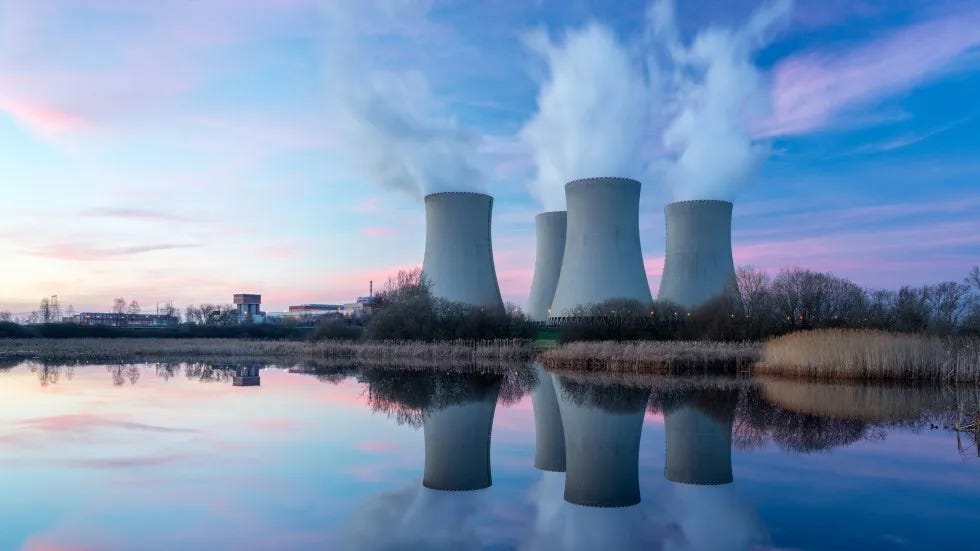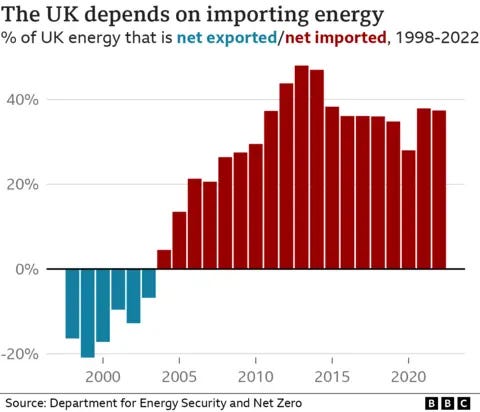A Nationalist Energy Policy
Energy independence requires real dedication to nationalist principles
For decades the political class of the West, and particularly of the United States, has spoken of energy independence - the notion that a nation should domestically produce all the energy that it consumes. This worthy goal has been promoted to the White public for decades but has never come to pass despite widespread public support. Politicians are eager to present so-called “Green” solutions as a path to a more stable energy market. Yet these technologies have yet to work (as promised) on a mass scale. Other politicians, generally of a conservative bent, are beholden to the global oil industry and foreign powers which favor higher prices and more pain at the pump for Westerners.
Nationalists, unlike Conservatives, neoliberals, or leftists, put the needs of the nation first in all things. In an age where energy prices are continuing to increase and threaten to worsen as global instability increases, nationalists must be equipped with the data and vision necessary to bring White nations out of the globalized system and into an order that is as domestically, and civilizationally, sustainable as possible.
The Current Situation:
Western (White) nations sit atop an abundance of energy resources and possess the expertise that is already working to create some of the most innovative new technologies out there, but neither of these resources is being harnessed for the benefit of the nation. Many nations such as the United Kingdom and the United States are not utilizing their domestic natural resources for the benefit of their populations, while other countries such as Germany have become near schizophrenic in their energy policymaking as the “Green” agenda has created chaos in their institutions.
Fossil Fuels:
Things are hardly better in other countries. The United States is the prime example of policymaking which does not put the needs of the nation ahead of the needs of the capitalist class. America, rather famously, produces more petroleum in a single day than it consumes domestically. The US Energy Information Administration report for the end of the 2023 year indicates that the US produced 21.7 million barrels of petroleum products per day while consuming 20.25 million barrels per day. A healthy surplus, yet most of the petroleum consumed by Americans will have been imported.
As of 2023, and again according to the US Energy Information Administration, the United States imported roughly 8.51 million barrels of petroleum products per day and exported 10.15 million barrels.
The main driver behind this is that American refineries are not built to refine the oil which is available in the United States, and instead focus on refining heavier imported oils. Additionally, the US is losing its refining capacities as a whole. Total capacity has declined by over 710,000 barrels per day since 2020 and six petroleum refineries in the US have closed in the last three years.
Another example of the abandonment of useful natural resources would be coal in the United Kingdom. The United Kingdom has an abundance of coal resources, with some estimates placing national reserves at 187 billion tonnes. Despite new and innovative technologies, the UK government has been hostile toward one of Britain’s most abundant natural resources and, along with other policies, has shifted the nation from one of energy exports to one of energy imports.
The same goes for British oil. Production has collapsed since the 1980s and investment has declined, even though the Norwegian government (which shares the oil-rich North Sea) with the UK estimates there are ample undiscovered resources in the area. Instead, the UK is now importing more expensive foreign-derived oil and fuels.
The US, and many European countries, need both more domestic refining capacity, and a steady level of production, and to begin moving away from this finite resource where possible.
Green Tech Isn’t There Yet:
There is nothing inherently wrong with scientific advancement. The recent innovations in battery technology, solar technology, and other energy-based solutions have been visionary. But this does not mean that these energy sources are particularly viable for nation-scale grids. Yet, national governments and the international community have crafted the policy environment to favor these ‘solutions.’ regardless of the cost to the national community(ies).
Wind power is pushed heavily by the US, UK, and European Union, yet it rarely lives up to expectations. While the United States has an installed wind capacity of 150,429 megawatts (MW), Britain sports 25,700 MWs, and the European Union boasts 255,000 MWs in installed capacity, these numbers are deceiving.
According to the US Department of Energy, green technologies are nowhere near as capable of producing the necessary amounts of energy that Western civilization requires. Nuclear power plants have a capacity factor (a measure of how often a plant is running at maximum power. It’s expressed as a percentage and calculated by dividing the actual unit of electricity output by the maximum possible output) of 92.5% while wind energy’s capacity factor is a mere 35.4% and solar is just 24.9%.
Progress is indeed being made in the realm of green energy. Battery capacity for electric vehicles has increased threefold since the 1980s and batteries in general are improving at larger (and smaller) scales. Still, Lithium-ion batteries are far too expensive as a grid-scale solution. New and innovative batteries (such as sodium-ion designs) are being invented that may one day enable renewables to play a far more constructive role in our energy infrastructure. But today is not the day and the post-national, globalist, and neoliberal elites pushing these solutions are doing so dishonestly and to the national detriment.
New technologies are exciting, but that does not make them solutions in and of themselves. Especially when other new technologies are ignored and old, reliable, technologies such as nuclear energy are written off without a proper public debate.
A Global Market:
Currently, energy prices are set by global market trends, and not by national governments or even corporations. Oil, natural gas, and other energy products (including electricity) are traded on market principles which result in price instability even for countries that produce much more energy domestically than they need.
Speculators, foreign powers, and regional conflicts are able to affect the price of oil for the entire world regardless of national geography.
Policy Solutions:
There are a raft of changes that could, and must, be made to create a larger degree of energy independence for White countries. This would also result in lower energy prices in many countries and could see other new and innovative technologies deployed to keep our climate clean which fall outside of the traditional climate change narratives currently being championed.
Nuclear Power:
Richard Nixon envisioned the creation of more than 1,000 nuclear power plants in the United States by the year 2000. This goal, titled Project Independence, would have resulted in the United States producing 200% of its electricity needs as of 2024 and would have effectively “de-carbonized” the US grid.
Nuclear power remains a desirable and viable source of cheap electrical power which could and should serve as the backbone of any nation’s national grid. The United Kingdom was the first country to deploy commercial nuclear power at Calder Hall and this legacy should be expanded upon rather than destroyed.
subsidies for the construction of wind and solar plants should be wound down and redirected to nuclear power plants
the regulatory environment must be simplified so that plants can be constructed rapidly
spent fuel must be redeployed to other generation sources to continue generating power for decades to come
A ‘Nation First’ Policy:
Selling excess oil, gas, electricity, and other products is intelligent. Nations can use export-derived income to build wealth and provide more services for their populations, but this must be done intelligently.
Some countries simply subsidize the price of imported oil at the pump, such as Kazakhstan. But when these subsidies stop instability inevitably follows. Rather than choosing between the dangers of a fully global market and the expense of subsidies nations must pick a middle ground.
Israel, for example, has differing contract forms for its domestic and international markets. Domestic consumption is secured through long-term contracts between the oil companies and the Israeli government which keep energy prices much, much, lower than the current global trends. While its exports to other countries are still linked to the global market.
As a result, Israel saw only a 2.8% increase in the cost of energy during the post-2020 energy crisis. The Netherlands saw household energy prices jump by over 900% and in Latvia prices increased by 139%, to name but two examples.
Nationalist policymakers should champion a transition to long-term contracts as the domestic norm. Oil and gas produced within the nation must be sold to the nation first and at a stable price point.
New Technologies:
Still, countries are going to want to transition away from finite resources, redeploy them in different ways, and in some cases satisfy the “climate lobby”. To do this new technologies will need to be deployed which can satisfy the majority of people and increase national self-reliance.
The United Kingdom, and its aforementioned coal reserves, are one such example. Britani could return to producing much of its energy from coal by building new plants that utilize carbon capture technology. A pilot project in the United States, Petra Nova CCS, saw over 90% of the carbon dioxide released from a newly constructed coal plant captured and prevented from being released into the atmosphere. The same technologies can be deployed on natural gas power plants
This carbon, using other new technologies, can be turned into a powdery solid or a liquid, and can then be used for other purposes ranging from building materials to batteries and even into types of fuel.
And, of course, there is still a place for renewables as they mature. A community in Canada was able to achieve 100% of its space heating needs through the use of solar technologies and underground storage. Electric vehicles continue to get better as well. According to the International Energy Administration, the average EV’s range has increased from just 80 miles in 2010 to 220 miles today, serving a distinct market segment in the process. EVs will continue to improve and be preferred by a segment of the population, but this does not mean that the current push and subsidy programs are desirable.
Conclusion:
Technology is progressing and globalism has stood in the way of deploying these technologies in a sensible form. The national interest has been decidedly put on the back burner in favor of global market trends and fanciful ideas about the applicability of new technologies that are not yet mature.
A healthy mix of traditional industry, new tech, and innovation all wrapped up in a cohesive nationalist vision for the future of the West is necessary in order to create the kind of progress, stability, and reliability that Whites so desire.
Support our mission to interact with more policymakers:
Zelle: whitepapersinstitute@protonmail.com
Buy us a coffee: https://www.buymeacoffee.com/wppi
Linktree: https://linktr.ee/wppi
Snail Mail: White Papers Policy, PO Box 192, Hancock, MD 21750






